SAP Ariba Sourcing Tutorial |SAP Ariba Contracts
Understanding SAP Ariba Pricing Terms
SAP Ariba pricing terms offer many interesting and practical applications for businesses like ours.
Pricing terms allow us to clearly and effectively define and manage line items representing goods or services purchased.
SAP Ariba allows us to define line items later during process steps for enhanced documentation and management.
SAP Ariba ensures an excellent documentation process and better oversight by giving us this flexibility.
Catalogue and Non-Catalogue Items in SAP Ariba
Catalogue items come fully prepared with all relevant data relating to pricing, description and supplier contact information, making selection easy during procurement processes.
Non-catalogue items require manual input of all details regarding price, description, commodity code and supplier info.
It’s like customising everything about our purchase to suit our requirements.
SAP Ariba’s catalogue makes searching and selecting items easy with predefined configurations for catalogue items, while non-catalogue items allow us to enter details manually for items not part of a catalogue.
Both approaches offer distinct benefits, yet are seamlessly managed within SAP Ariba.
SAP Ariba Catalogue Management
Managing catalogues in SAP Ariba is an essential part of optimising procurement.
SAP Ariba provides a dedicated catalogue section where we can maintain all necessary data, including descriptions, pricing, and supplier details for various items.
By keeping this information organised, SAP Ariba helps streamline the procurement process.
Minimum and Maximum Order Quantities in SAP Ariba
SAP Ariba allows us to set minimum and maximum order quantities for line items, providing greater control and helping maintain balance during purchasing activities.
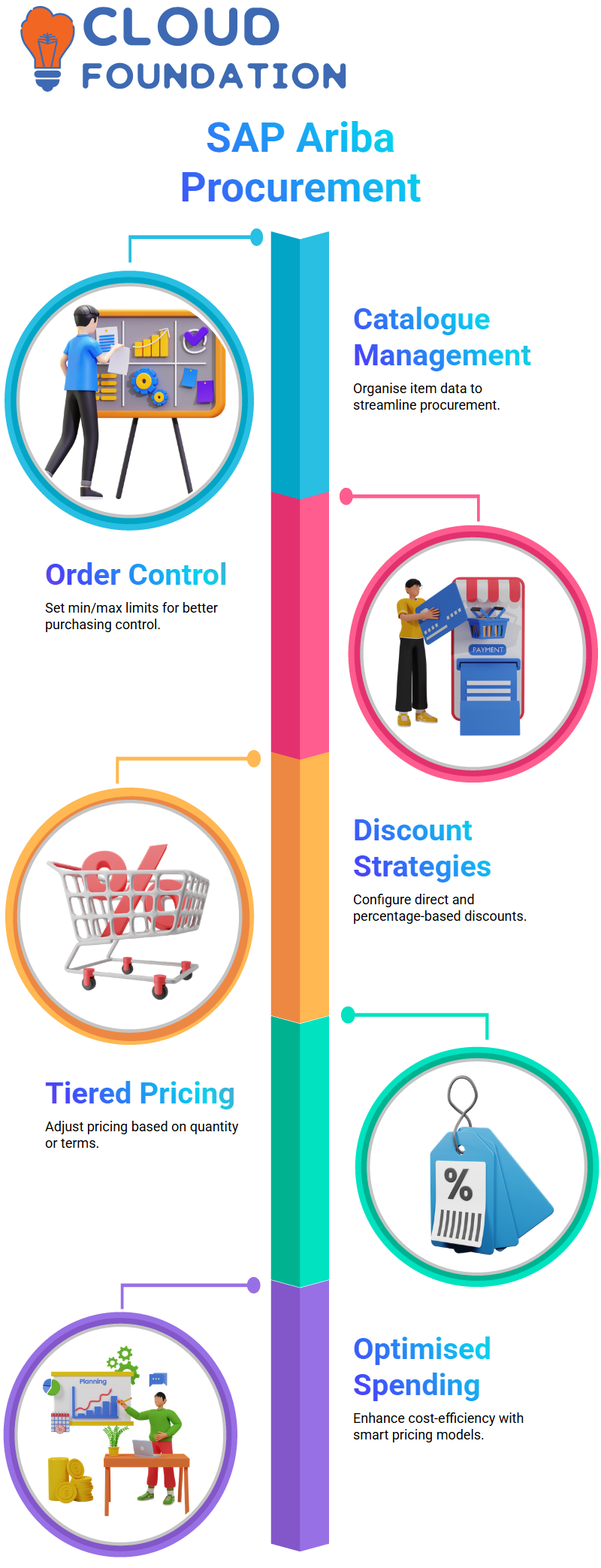
In other words, these features help maintain better control of purchasing operations and ensure balance among purchases made within a budget.
Discounts and Pricing Strategies in SAP Ariba
SAP Ariba provides outstanding tools for effectively managing discounts and pricing strategies, such as direct or percentage discounts on items.
You could create offers such as “buy one, get one free” or percentage discounts, like those we often see in malls.
SAP Ariba allows us to configure discounts efficiently.
Utilising term-based and tiered pricing models helps tailor strategies based on quantity or specific terms, and is an efficient way of cutting spending.
Understanding SAP Ariba Tiered Pricing
Tiered pricing is one of SAP Ariba’s hallmarks, providing discounts based on purchase amounts or quantities. Users will likely have encountered it.
Suppliers can set tiered discounts that scale with volume purchases through SAP Ariba’s tiered pricing feature.
Say a buyer orders 5,000 units–in that case, the system applies a 2% discount.
But when does that order jump to 7,000 units?
That discount could increase to 5%; at 15,000 units, it might even reach 10%.
How SAP Ariba Helps Set Volume-Based Pricing
SAP Ariba provides various discount options, including volume-based pricing.
Suppliers can set price reductions based on how many units a buyer purchases.The larger their order is, the lower its cost.
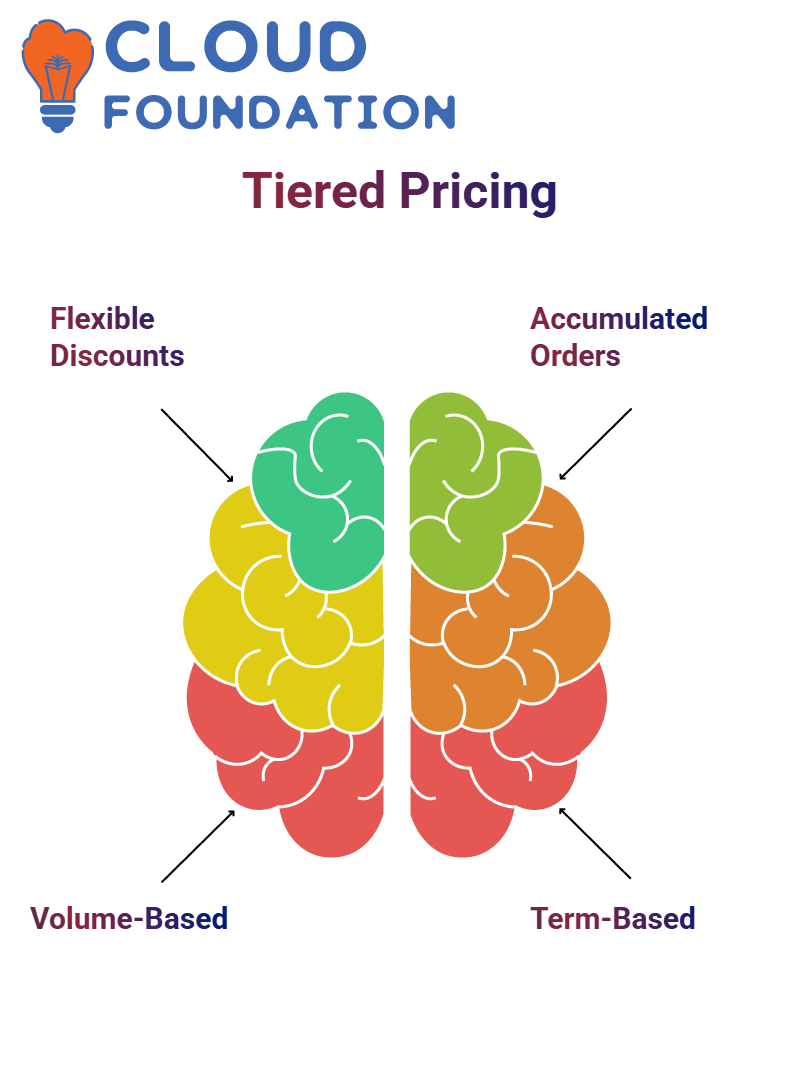
For example, when placing three units, SAP Ariba might apply a 2% discount.
SAP Ariba automatically accumulates total purchases within an agreed period and increases discounts accordingly.
Leveraging Term-Based Pricing in SAP Ariba
SAP Ariba’s term-based pricing feature can also provide suppliers with additional leverage.
They can use dates to set discounts based on festive season promotions or limited promotional periods.
SAP Ariba ensures the correct discount applies during that timeframe by specifying start and end dates for pricing periods.
SAP Ariba makes pricing simple – whether that means managing Diwali discounts of 10% off, or seasonal rebates of 5-10% off.
Cumulative Order Discounts in SAP Ariba
SAP Ariba supports cumulative order discounts, in which discounts increase with repeated orders of 3 units at once and reward customers who order again later.
For instance, a buyer placing three orders receives an initial 2% discount after 15 days, when placing another 3-unit order and receives yet another discount of 2%.
SAP Ariba will automatically apply a higher discount since your order comprises six units.
Pricing Limits and Minimum Price Rules in SAP Ariba
SAP Ariba allows suppliers to set pricing limits based on inventory levels or business strategies.
When inventory drops low, suppliers can increase prices, while when there is plenty to go around, they can decrease them to encourage bulk buying.
SAP Ariba ensures fair pricing by setting minimum and maximum price limits; adjustments based on availability can be made as necessary.
Using SAP Ariba for Smarter Pricing Strategies
Suppliers can customise their pricing models using SAP Ariba in several ways, including tiered pricing, volume discounts, cumulative order pricing and time-based promotions.
This system equips businesses to drive sales effectively while offering buyers incentives that make bulk purchases worthwhile.
Understanding Discounts in SAP Ariba
It is of utmost importance to handle discounts efficiently when working with SAP Ariba, which offers users two discount schemes: value- and scale factor-based.
Many users tend to favour value-based discounts as they’re easier to implement.
Users new to SAP Ariba should take the time to explore its discount settings independently and play around with tiered pricing models to become familiar with them.
At an academic level, one needs a thorough grasp of these pricing models for SAP Ariba to work effectively.

Expertise with SAP Ariba can often be measured during evaluations or discussions.
Mastering Milestone Payments in SAP Ariba
SAP Ariba provides seamless access control. Users can set limits based on contract amounts available and then automatically trigger notifications so everyone remains informed.
SAP Ariba’s access control feature is intuitive yet effective: assign names to predefined limits.
As users publish contracts, SAP Ariba informs all involved about available amounts in real time.
Access Control and Notifications in SAP Ariba
SAP Ariba provides seamless access control. Users can set limits based on contract amounts available and then set notifications that keep everyone updated and aware.
SAP Ariba’s access control feature is both user-friendly and practical. Users assign names to predetermined limits, and as users publish contracts, SAP Ariba informs all parties involved of available amounts in real time.
Exploring Payment Terms and Appendix in SAP Ariba
SAP Ariba’s payment terms can easily be tailored to fit the unique requirements of each organisation, should their default terms not meet them.
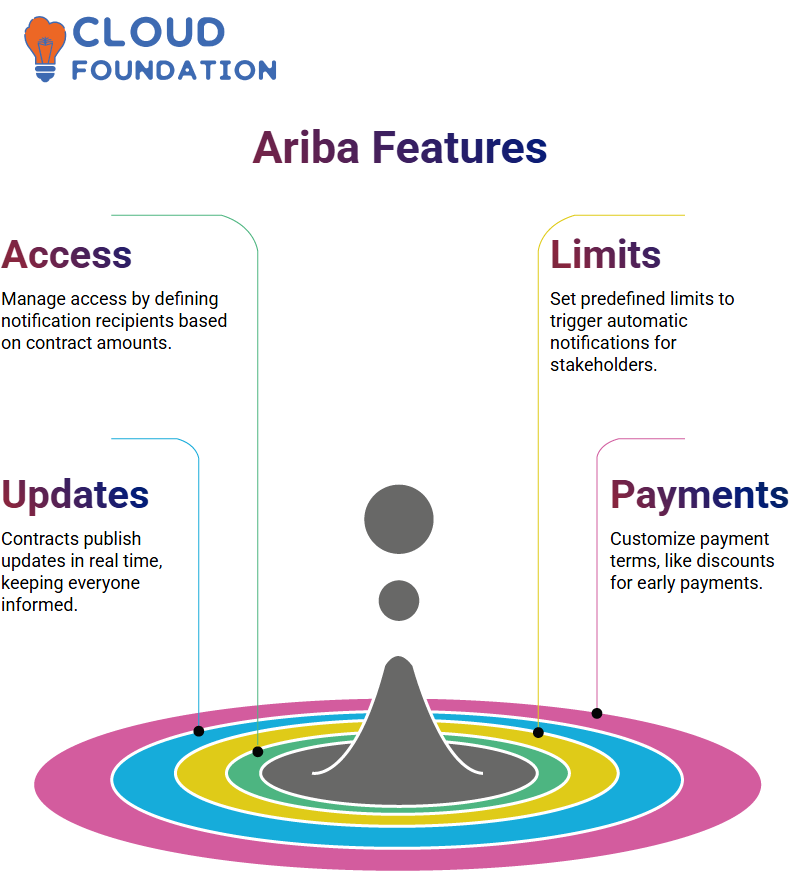
For payments made within 10 days, you might decide that an incentive, such as an early discount of 2%, should be offered.
SAP Ariba makes this process intuitive and user-friendly, offering many useful features like the appendix section, where users can attach any necessary documents related to contracts or projects for easy retrieval later.
Summarising Data in SAP Ariba
SAP Ariba provides an in-depth contract summary section that accurately snapshots your commitment amounts, pricing terms, milestones, and crucial details.
SAP Ariba makes sure any milestone items defined by users can easily be reviewed and managed for review and management purposes.
Understanding SAP Ariba Contract Attributes
As part of your contract work, you encounter features like term and contract attributes, which allow for changes.
When working within an online workspace contract environment.
However, such attributes may prove confusing; any questions raised suddenly become the responsibility of an experienced administrator to solve.
Difference Between Contract Attribute and Term Attribute. A contract attribute is the cornerstone of your agreement, detailing factors like type, article type, contract amount, supplier details, affected parties and sub-agreements.
Master/sub-agreement relationships play a pivotal role in this scenario.
Imagine creating a master agreement worth 100 and subdividing it into three sub-agreements worth 25, 25, and 50 each, then subdividing them further.
SAP Ariba implements the master-child agreement structure, wherein one agreement acts as a parent for any sub-agreements it creates as children.
When creating any sub-agreement, its master agreement should also be defined.
Exploring SAP Ariba Actions and Attributes
In SAP Ariba’s Actions section, users will discover various functions, such as publishing, amending, placing contracts on hold, and closing them.
In particular, contract attributes offer you all these capabilities at once.
SAP Ariba allows for term attributes related to timing. This section determines whether terms are fixed or variable, sets effective and expiry dates, and manages notifications, helping ensure contracts meet timeliness and compliance needs.
Task Management in SAP Ariba
Tasks in SAP Ariba are straightforward and remarkably powerful, similar to functions created for SLP/sourcing processes.
Utilising templates, they can be customised per your business requirements.
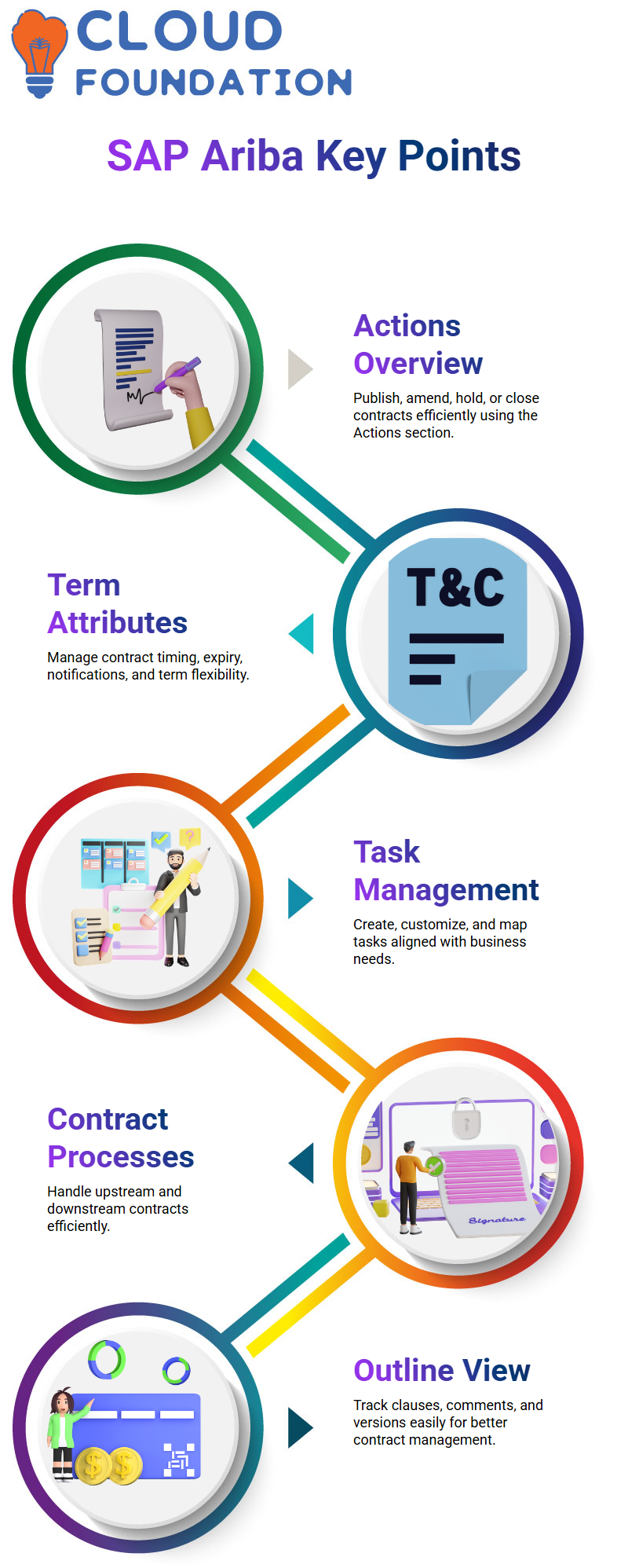
Users may create individual phases/tasks/notifications customised to specific requirements.
Templates help define your mapping process and ensure every step aligns with operational goals.
Contract Management in SAP Ariba
Regarding SAP Ariba contract management, we utilise both upstream and downstream processes.
The upstream process entails contract workspace creation, clause libraries management and master agreement administration.
Key features needed for long-term, complex contracts that last years or decades.
SAP Ariba provides efficient contract tracking even as contracts evolve through discussions and negotiations.
Its outline view shows clauses, types, and comments to make versioning simpler and easier to manage.
Companies facing difficulties with long-term contracts will find this feature particularly valuable.
Publishing and Approval in SAP Ariba
SAP Ariba’s publishing process is both seamless and methodical.
Contracts cannot be published if all required tasks have not been completed and approved before publishing a workspace contract.
Approval workflows exist to prevent process bypassing.
SAP Ariba’s authorisation features allow users to act on behalf of others when necessary and ensure smooth operations while keeping control of them.
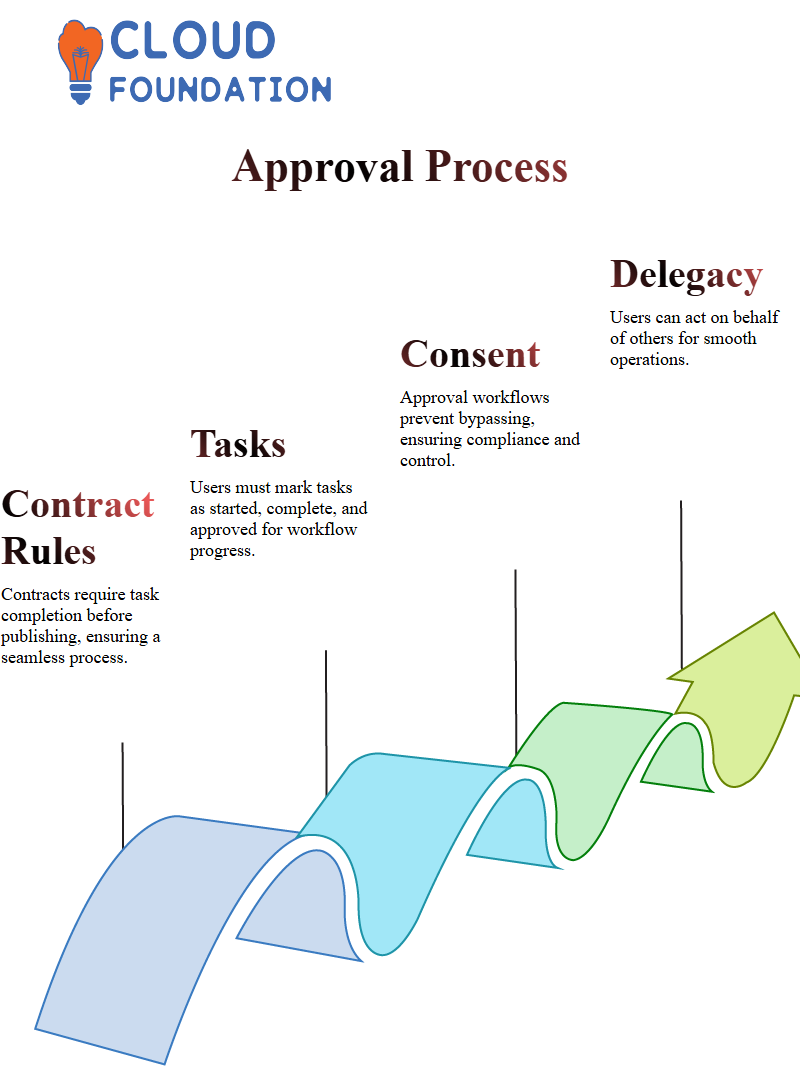
Managing Approvals in SAP Ariba
SAP Ariba makes approval management seamless. Acting on behalf of users, you navigate the user-friendly interface quickly to complete approval processes.
Utilising its tools, approvals are just one click away: review details before approving or denying as necessary.
SAP Ariba’s user-friendly features help ensure you never miss a beat, whether through email notifications or directly on its homepage.
Leveraging Contract Workspaces in SAP Ariba
Contract workspace in SAP Ariba can be transformative.
Users begin by setting up the contract workspace, which securely stores all essential documents, and then complete assigned tasks efficiently and effortlessly.
Publication of your workspace becomes effortless after following the negotiation process with suppliers and ensuring all documentation is completed and available for viewing.
SAP Ariba stands out as a market leader because of its centralised management approach, which makes it simpler for companies to oversee all data and documents efficiently.
The Art of Negotiation in SAP Ariba
Negotiation tasks in SAP Ariba are tailored for contract situations.
Once attached to the task, effective communication with suppliers becomes paramount for its completion.
SAP Ariba can ensure all parties remain on the same page, helping reduce disputes and enhance transparency.
The platform facilitates multiple rounds of negotiation to accommodate unexpected changes or potential disputes that might arise during negotiations.
Handling Amendments with SAP Ariba
SAP Ariba makes amending contracts easy. From renewing contracts nearing their expiry, making changes, or terminating them altogether, to renewing contracts nearing expiration, SAP Ariba categorises amendments into renewal, modification, administrative, and termination categories for easy navigation.
Each type is straightforward and ensures every aspect, such as timelines or termination clauses, is managed effectively within its system.
Streamlining Contract Terms in SAP Ariba
Easily add and edit contract terms using SAP Ariba, then publish and modify them once published for changes and additional terms that need to be included.
SAP Ariba ensures accuracy and compliance with its structured process for updating and maintaining these terms.
All schedules, costs and legal contracts are easily manageable and accessible for viewing or editing.
Understanding SAP Ariba Contract Management
SAP Ariba’s contract management features can excite the journey from contract creation to approval.
Your journey starts with creating a contract request (CR).
SAP Ariba assigns every request its unique number; for instance, “CR324”.

Once both parties have completed and approved all the details, that request becomes an official contract C324.
However, SAP Ariba maintains this identifier, so tracking remains seamless.
SAP Ariba Contract Terms in Action
First, SAP Ariba’s contract terms must be established, initiating a request.
However, before proceeding, additional attributes, such as supplier, may need to be adjusted to streamline downstream operations even more smoothly.
SAP Ariba allows users to configure suppliers directly within its system for smooth operations.
Two conditions are essential to successful contract processing using SAP Ariba: both parties should have established trading relationships.
Otherwise, errors could arise, which SAP Ariba effectively assists with.
Master Data and SAP Ariba Contract Attributes
SAP Ariba streamlines the setup of master data, such as expiration and effective dates. These details come standard but may be altered as required.
Switches are essential in configuration; for instance, the “Release Required” toggle helps determine whether contracts will be used via purchase orders.
SAP Ariba provides numerous contract types, including supplier, catalogue, commodity, and item-level consumer contracts.
Each type meets specific business needs; whether the user deals with large suppliers like Cisco or smaller vendors, SAP Ariba ensures contracts are tailored precisely.
Working with SAP Ariba Contract Types
SAP Ariba provides three contract types for business transactions: supplier-level agreements (allowing broad agreements among suppliers for any item they deal in), catalogue-level contracts, and commodity-level agreements, which focus exclusively on one type of commodity, like IT.
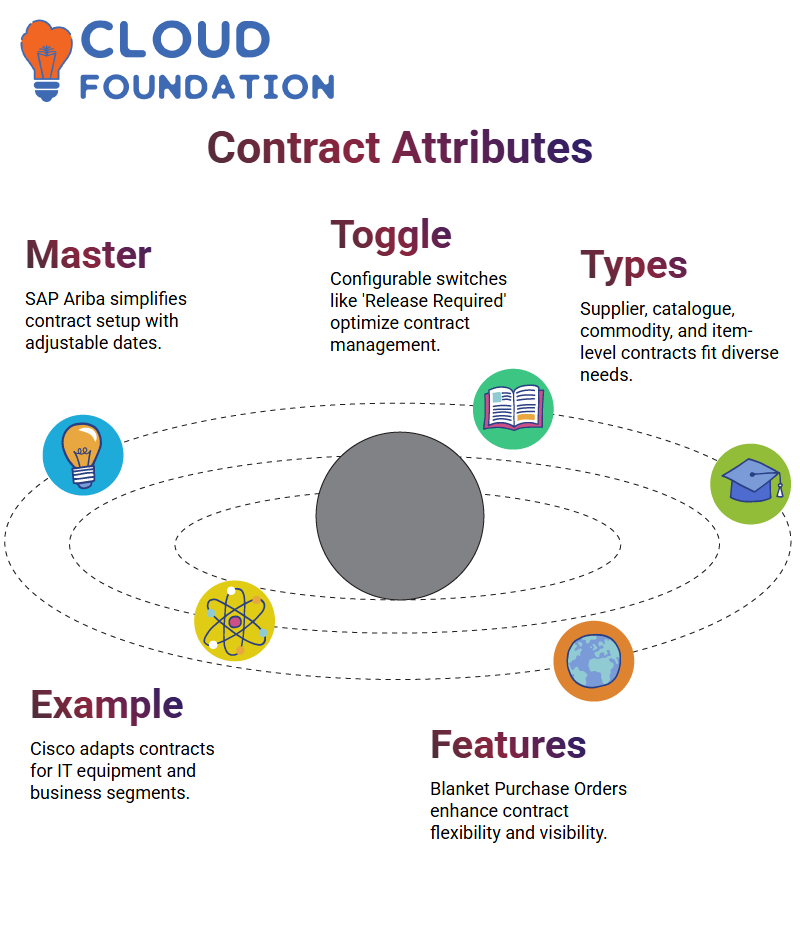
Item-level contracts are the most frequently utilised type, focusing on specific items from suppliers. One notable supplier, for example, is Cisco, which provides items to companies like Airtel.
Cisco supplies IT equipment like routers or servers while maintaining separate departments for fibre optics or other business segments.
SAP Ariba allows them to customise contract types to accommodate such unique business segments.
Key Features of SAP Ariba Contracts
SAP Ariba incorporates essential features like Blanket Purchase Orders (BPO).
BPO allows contracts to be sent as purchase orders to suppliers within the system for easy viewing, providing added convenience and flexibility. This feature adds great ease and versatility.
SAP Ariba makes managing substitute items or toggle switches like “Release Required” easy and ensures your contracts meet specific operational needs.

Sai Susmitha
Author



